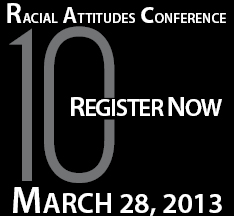Conference Marks 10 Years of Research
For the 10th consecutive year, UALR will host the Racial Attitudes in Pulaski County Conference. The event will take place Thursday, March 28, at the Stella Boyle Smith Concert Hall in the Fine Arts Building.
Crime and Punishment Focus of 2013 Survey
 During the conference, the UALR Institute on Race and Ethnicity will present and lead discussion of the findings of the 2012-13 survey, on crime and punishment, conducted by the UALR Institute of Government.
During the conference, the UALR Institute on Race and Ethnicity will present and lead discussion of the findings of the 2012-13 survey, on crime and punishment, conducted by the UALR Institute of Government.
Chancellor Joel E. Anderson will address what it means to the state of Arkansas to have 10 years’ worth of data on racial attitudes by highlighting trends that have surfaced during the survey collection process.
“People find it easy to dismiss national data as not really relevant to state or local problems. It is hard to deny the findings of a local survey,” he said. “Over the last decade the annual surveys on racial attitudes, and the work of the Institute over the last two years, have increased awareness of the fact that there is still a racial divide here.”
Adjoa A. Aiyetoro, director for the Racial Disparities in the Arkansas Criminal Justice System project, will join a panel of stakeholders to address the survey results. Following the panel discussion, the audience will participate in a round table strategy session on community issues.
The event is free and open to the public. The conference will begin at 9 a.m. followed by the roundtable strategy session from noon until 2 p.m. Lunch will be provided. Register online at the 10th Racial Attitudes Conference site.
Featured panelists will include retired Appellate Court Judge Olly Neal, Robert Tellez of the Monterrey and Tellez law firm, Leta Anthony of the Willie Hinton Neighborhood Resource Center, Little Rock Assistant Chief of Police Eric Higgins, and Dr. Charles Chastain of the Prison Library Project and professor emeritus of criminal justice at UALR.
IOG has collected data on attitudes concerning race relations in central Arkansas since the beginning of Anderson’s tenure as chancellor in 2003.
“Consistent with a pledge in the university’s strategic plan, UALR has been a keeper of the flame on the subject of race,” said Anderson.
The UALR Institute on Race and Ethnicity was founded in July 2011 to seek racial and ethnic justice in Arkansas by remembering and understanding the past, informing and engaging the present, and shaping and defining the future. It serves as a resource for multidisciplinary, research-driven data – including historical, sociological, educational, and economic analyses to combat structural racism and fulfill its mission.
To learn more about the 2013 Racial Attitudes Conference, go to the 10th Racial Attitudes Conference site.
For more information, contact the Institute at race-ethnicity@ualr.edu or by phone at 501-569-8932.